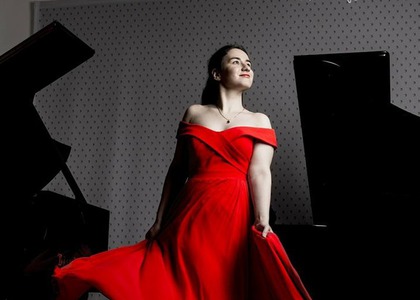> Interviews

Interview with pianist Adela Liculescu
On the 23rd of April, at 19:00, pianist Adela Liculescu presents a remarkable recital at the Romanian Athenaeum, featuring the complete set of Franz Liszt's 12 Transcendental Études, an event recorded by Radio România Muzical.
Behind this recital lies a true story between Adela Liculescu and Franz Liszt's piano music. So, Adela, please tell us more about this story!
I have been immersed in this music during my doctoral studies in Graz for the past four years. This year, as I complete my doctorate, I thought it was a special occasion, as this program is rarely performed. Especially in Romania, I'm not sure if it has ever been performed before. That's why I thought it was an opportunity to present this program to the Romanian audience. Thus, this is how this recital at the Romanian Athenaeum came to life, and I can't wait to perform this seton the 23rd of April, at 19:00, in Bucharest.
Did you discover anything special by analyzing these studies during your doctoral research?
The idea of my doctoral research stemmed from the fact that when we talk about Liszt's music and virtuosity, we often refer to something that is meant to impress, focusing on the technical, mechanical aspect of virtuosity. It's often heard that Liszt's music is superficial and only concentrates on virtuosity. That was the starting point for me because I always felt that there is also a profound expressiveness hidden in this music, and I wanted to demonstrate that this expressiveness can still be found and deciphered within the musical text. I practically show how this can be done.
Very interesting indeed! So, we will have all 12 Transcendental Études. Is there one among them for which you have a special affinity, one that wants to convey something different than how it's usually perceived, in your interpretation?
Each étudetells its own story. My favorite is number 11, "Evening Harmonies." For me, it's like the culmination of the entire cycle, and it's a piece of music that always touches me deeply.
You've presented Liszt's music in past events - I've seen them in Romania, I'm not sure if abroad as well - and I wanted to ask about those and about theupcoming events, if there are any other projects related to Liszt and Adela Liculescu?
Recently, there have been more concerts with the orchestra in Romania. I've performed either both Liszt concertos in the same program or one of Liszt's concertos along with the Hungarian Fantasy. These concerts took place in Craiova, Brașov, and Iasi. I've also performed, for example, in Pitesti and Valcea as part of the "George Enescu" Festival events, opening the seasons there with Liszt's music. There have also been some recitals with the Transcendental Étudesin Craiova, Brasov, and Focsani. Now, the recital at the Athenaeum follows, which, being in this wonderful hall, is somewhat the culmination of everything that has been done so far in Romania. And I will also perform the same program on the 17th of Mayin Vienna, at the Eschenbach Palace. And, of course, there are many more concerts with other programs to come, but these were my artistic presentations within my doctoral project.
Photo credit: Nancy Horowitz for Thyll-Dürr Foundation
Translated by Marian-Cătălin Niculăescu,
University of Bucharest, Faculty of Foreign Languages and Literatures, MTTLC, year I
Corrected by Silvia Petrescu














